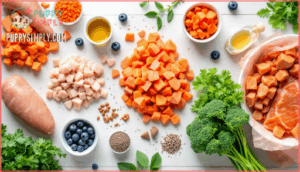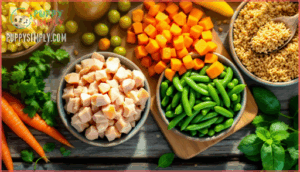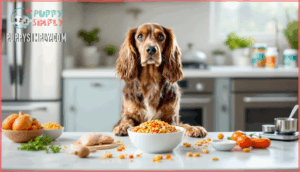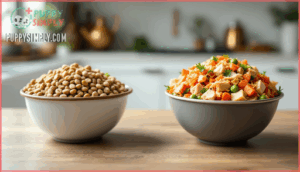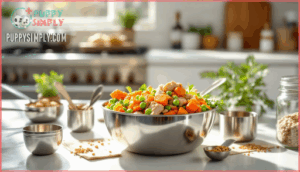This site is supported by our readers. We may earn a commission, at no cost to you, if you purchase through links.
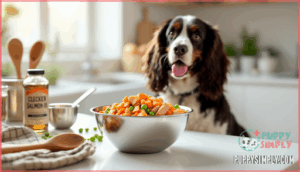
Start with simple recipes combining lean protein, brown rice, and dog-safe vegetables. Cook ingredients thoroughly and switch gradually over seven days using the "quarter rule" to avoid stomach upset.
Watch for allergic reactions to common triggers like beef, dairy, or wheat. Always consult your vet before switching diets, since 95% of homemade meals lack essential nutrients without proper planning and supplementation, making it crucial to consider complete control over your pup’s nutrition and common food sensitivities.
Table Of Contents
- Key Takeaways
- Benefits of Homemade Food
- Nutritional Needs of Cocker Spaniels
- Homemade Food Recipes for Cocker Spaniels
- Risks and Considerations of Homemade Food
- Preparing and Transitioning to Homemade Food
- Maintaining a Balanced Homemade Diet
- Frequently Asked Questions (FAQs)
- What’s the best food to feed a cocker spaniel?
- What do vets recommend for homemade dog food?
- What not to feed cocker spaniels?
- What is the best homemade food to feed a dog at home?
- What foods should cocker spaniels avoid?
- How much homemade food per day?
- Can I freeze homemade cocker spaniel food?
- What supplements do cocker spaniels need?
- How long does homemade food last?
- When to switch from puppy recipes?
- Conclusion
Key Takeaways
- You’ll get complete control over your cocker spaniel’s nutrition by making homemade food, allowing you to avoid fillers and artificial additives that trigger their sensitive stomachs while customizing meals for specific allergies or health needs.
- Start with balanced recipes containing 18-25% protein from sources like chicken or turkey, plus healthy fats from salmon oil and fiber-rich vegetables like sweet potatoes to meet your cocker spaniel’s nutritional requirements.
- Transition gradually over seven days using the "quarter rule" – mix 25% homemade food with 75% current food initially, increasing homemade portions by 25% every two days to prevent digestive upset.
- Always consult your vet before switching diets since 95% of homemade meals lack essential nutrients without proper planning, and you’ll need professional guidance to avoid nutritional deficiencies that could harm your dog’s health.
Benefits of Homemade Food
Making your own cocker spaniel’s food gives you complete control over what goes into their bowl, helping you avoid fillers and artificial additives that might trigger their sensitive stomachs.
Take the reins of your cocker spaniel’s nutrition with homemade meals that nourish from the inside out.
You’ll save money while creating meals perfectly suited to your pup’s specific needs and taste preferences.
Cost-Effective Alternative
Why spend a fortune on premium kibble when your cocker spaniel’s homemade dog food can deliver better nutrition for less?
Smart ingredient sourcing and bulk buying slash costs dramatically, while recipe optimization helps stretch affordable ingredients like chicken, rice, and seasonal vegetables.
Leftover utilization from your meals reduces waste while creating easy dog food recipes, which is a key factor in making a quality cocker spaniel diet affordable for any budget with long-term savings.
Customization and Control
Take control of your cocker spaniel’s nutrition by crafting meals that fit their unique needs perfectly. When you make homemade dog food, you’re the chef calling the shots on every ingredient.
Here’s what customization brings to your cocker spaniel diet:
- Ingredient Selection – Choose high-quality proteins and avoid fillers that upset sensitive stomachs
- Allergy Management – Skip common triggers like beef, dairy, or wheat that cause skin issues
- Recipe Tailoring – Adjust recipes for your dog’s age, weight, and activity level
- Portion Adjustment – Control serving sizes to prevent weight gain in less active dogs
- Dietary Needs – Address specific health concerns through targeted dog diet customization
This level of control makes homemade dog food incredibly valuable for cocker spaniel nutrition, especially since this breed often struggles with dog food allergies and digestive sensitivities; remember to keep in mind labrador calorie requirements when planning your dog’s meals.
Improved Health and Hydration
Beyond the familiar benefits of homemade meals, you’ll notice remarkable health improvements in your Cocker Spaniel.
Fresh ingredients naturally boost hydration levels, supporting kidney function and overall well-being. Your furry friend’s digestive system processes whole foods more efficiently, leading to better nutrient absorption and increased energy levels.
| Health Benefit | Fresh Ingredients | Commercial Food |
|---|---|---|
| Hydration Support | High moisture content aids kidney support | Often lacks adequate moisture |
| Digestive Health | Whole foods promote digestion boost | Processed fillers may cause issues |
| Allergy Management | Eliminates common triggers for allergy relief | Contains potential allergens |
| Energy & Vitality | Natural nutrients sustain energy levels | Artificial additives provide short bursts |
Enhanced Skin and Coat Health
Your dog’s skin and coat will thank you for switching to homemade meals packed with Omega Fatty Acids from fish oil and flaxseed.
Quality Protein Importance shows as muscle development supports healthy skin cell renewal.
Hydration Benefits keep skin supple while Allergen Avoidance eliminates triggers causing dullness.
You’ll notice improved Coat Shine within weeks – making this the best dog food cocker spaniel owners choose for ideal skin health and Cocker Spaniel care.
Nutritional Needs of Cocker Spaniels
Your Cocker Spaniel needs the right balance of protein, fats, carbs, vitamins, and minerals to stay healthy and happy.
Understanding these nutritional basics helps you create meals that support their energy levels, beautiful coat, and overall well-being.
Protein Sources and Requirements
Your cocker spaniel’s protein needs aren’t one-size-fits-all. Adult dogs require 18-25% protein on a dry matter basis, while growing puppies need 22-28% for proper development.
Just like humans, your Cocker’s dietary needs evolve with age and activity level
Just like you tailor meals to family members’ needs, your Cocker’s protein requirements change with age and growth.
Think of protein as your dog’s building blocks—without quality sources, their health crumbles like a house of cards.
- Chicken, lamb, and beef provide complete amino acid profiles with 90% digestibility
- Cooked eggs offer the highest biological value protein for ideal absorption
- Salmon and sardines deliver protein plus omega-3s for brain and coat health
- Organ meats (liver, kidney) supply dense nutrition at just 5% of total protein intake
- Protein supplements like taurine prevent deficiencies in plant-heavy homemade puppy food recipes
Healthy Fats and Carbohydrates
Regularly incorporating healthy fats and complex carbohydrates creates the foundation for your Cocker Spaniel’s energy balance and vibrant coat.
Omega-3 benefits shine through when you rotate salmon oil, flaxseed, and coconut oil in their healthy dog food. Sweet potatoes and brown rice provide steady fuel without the sugar crashes.
| Healthy Oils | Fiber Sources | Benefits |
|---|---|---|
| Salmon Oil | Sweet Potatoes | Joint mobility, brain function |
| Flaxseed Oil | Brown Rice | Skin health, digestive support |
| Coconut Oil | Oats | Antimicrobial, easy digestion |
This balanced diet approach keeps your dog food for Cocker Spaniels nutritionally sound while supporting their active lifestyle.
Essential Vitamins and Minerals
Your cocker spaniel’s vitamins and minerals work like tiny mechanics keeping everything running smoothly.
Vitamin A from carrots and sweet potatoes supports those beautiful spaniel eyes, while B-vitamins in meats boost energy levels.
Calcium and phosphorus need balanced ratios around 1.2:1 for strong bones.
Watch for vitamin deficiencies that cause poor coats or lethargy.
Mineral absorption improves with quality supplement sources, meeting specific cocker needs through carefully chosen dog food ingredients.
Hydration and Digestion
Water plays a huge role in your Cocker Spaniel’s digestive health.
Here’s how to keep things flowing smoothly:
- Water Intake: Provide fresh water daily – aim for 1 ounce per pound of body weight
- Fiber Sources: Add pumpkin or sweet potatoes to support healthy gut movement
- Digestive Enzymes: Consider probiotics to boost your dog’s gut microbiome naturally
- Bloat Prevention: Feed smaller, frequent meals instead of one large portion
- Hydration Monitoring: Watch for signs like dry gums or lethargy indicating dehydration
Homemade Food Recipes for Cocker Spaniels
Creating nutritious homemade meals for your Cocker Spaniel doesn’t have to be complicated or time-consuming.
These four proven recipes provide balanced nutrition while catering to your dog’s taste preferences and any specific dietary needs they might have.
They offer a solution that is both easy to implement and tailored to your dog’s unique requirements.
Chicken and Rice Delight
One simple chicken and rice recipe transforms into your cocker spaniel’s favorite meal with just a few dog-friendly ingredients.
Combine boneless chicken, brown rice, carrots, and peas for balanced nutrition.
Cooking methods include boiling or steaming to retain nutrients.
Storage solutions involve refrigerating portions for three days or freezing individual servings.
Recipe variations can include sweet potatoes or green beans for added fiber and vitamins. Consider chicken rice dog products as well.
Turkey and Vegetable Feast
Turkey offers lean protein that’s perfect for Cocker Spaniels with sensitive stomachs. This Recipe Variations approach uses dog-friendly ingredients that support healthy digestion. Your Cooking Methods matter—steam vegetables lightly to preserve nutrients while ensuring easy absorption.
Many owners find turkey-based dog food beneficial for their pets. The benefits of this approach include a variety of sensory experiences, such as:
- Ground turkey sizzling in the pan with aromatic herbs filling your kitchen
- Colorful diced sweet potatoes, carrots, and green beans creating a rainbow medley
- Steam rising from perfectly cooked vegetables that retain their vibrant colors
- Your Cocker Spaniel’s tail wagging as delicious aromas drift through the house
- Portioned meals cooling in containers, ready for your pup’s next feast
Focus on Ingredient Sourcing from trusted suppliers. It’s also important to consider Storage Solutions to maintain freshness, such as storing prepared dog food recipe ideas in refrigerator containers for up to three days, following proper storage guidelines to keep your Cocker Spaniel’s meals fresh and nutritious.
Beef and Veggie Medley
This hearty beef and veggie medley combines lean ground beef with nutrient-packed sweet potatoes, spinach, and quinoa.
You’ll love how easy this recipe is—simply brown the beef, add diced vegetables, and simmer until tender.
Perfect for cocker spaniels needing protein-rich meals, this beef and sweet potato stew offers excellent ingredient sourcing flexibility.
Adjust portions based on your dog’s weight for ideal breed suitability.
Blueberry-Banana Treats
Surprise your Cocker Spaniel with these wholesome blueberry-banana treats that’ll have their tail wagging like a metronome! These homemade dog treats pack serious nutritional value while being gentle on sensitive stomachs.
Treat Ingredients & Baking Techniques:
- Mash ripe bananas with fresh blueberries and oat flour
- Bake at 350°F for 15-20 minutes until golden
- Store in airtight containers for freshness and easy serving suggestions
These treats can also help with allergy and digestion for sensitive dogs.
Risks and Considerations of Homemade Food
While homemade food offers wonderful benefits for your Cocker Spaniel, it’s not without its challenges that every dog parent should understand.
You’ll need to navigate potential nutritional gaps, ingredient safety concerns, and your pup’s specific health needs to create truly balanced meals.
Potential Nutritional Deficiencies
Despite good intentions, homemade dog nutrition often falls short.
Research shows 95% of homemade diets lack essential nutrients, creating vitamin imbalances and mineral shortages.
Your cocker spaniel might face macronutrient deficits in protein, calcium-phosphorus ratios, and omega fatty acids.
Deficiency symptoms include dull coats, skin issues, and weakened immunity.
Meeting supplementation needs requires careful planning to prevent nutritional imbalance.
Consulting a vet for personalized dietary guidance is highly recommended.
Safety of Ingredients and Allergens
Your dog’s safety hinges on smart ingredient choices.
Toxic ingredients like onions, garlic, grapes, and chocolate can harm your Cocker Spaniel.
Safe preparation means knowing what’s off-limits and understanding your dog’s specific food sensitivities.
Watch for these common dog allergies:
- Beef and chicken – surprisingly frequent allergens
- Dairy products – can trigger digestive upset
- Wheat and corn – common grain sensitivities
- Eggs – another sneaky culprit
Ingredient sourcing matters too – choose fresh, quality foods and practice allergen identification early.
Health Conditions and Considerations
Several health conditions require special attention when preparing homemade food for your Cocker Spaniel.
These breed-specific concerns can make or break your dog’s wellbeing if ignored.
| Condition | Dietary Restriction | Management Strategy |
|---|---|---|
| Skin Issues | Avoid beef, dairy, wheat | Use novel proteins like duck |
| Ear Infections | Limit high-sugar foods | Add omega-3 fatty acids |
| Weight Problems | Control calories strictly | Increase fiber-rich vegetables |
| Kidney Disease | Restrict phosphorus, sodium | Choose lean, low-mineral proteins |
| Pancreatitis | Eliminate fatty meats | Stick to ultra-lean options |
Allergy Management becomes essential since protein sources trigger most canine dietary needs issues, while Nutrient Deficiencies develop without proper planning for dog health tips implementation.
Importance of Veterinary Consultation
Before switching to homemade food, you’ll want your veterinarian’s blessing – think of them as your co-pilot in this nutrition adventure.
Vet guidance guarantees proper diet planning and health monitoring suited to your Cocker Spaniel’s needs.
Professional consultation benefits include spotting potential deficiencies and creating vet-approved recipes that’ll keep your furry friend thriving safely.
Preparing and Transitioning to Homemade Food
Making the switch to homemade food for your Cocker Spaniel doesn’t have to feel overwhelming—with the right approach, you’ll have your pup happily munching on nutritious meals in no time.
The key is taking it slow and paying attention to how your furry friend responds to each new ingredient and meal, which is a complete concept to ensure a smooth transition.
Proper Food Preparation and Storage
When you’re ready to cook for your Cocker Spaniel, food safety becomes your kitchen compass.
Proper hygiene practices and cooking methods protect your pup from harmful bacteria while preserving essential nutrients.
- Cook thoroughly: Steam or lightly boil ingredients to eliminate pathogens without destroying vitamins
- Store safely: Refrigerate homemade dog food in sealed containers for up to three days
- Practice cleanliness: Wash hands, utensils, and surfaces before meal planning and preparation
Additionally, proper dog food storage is essential, and using dog food storage solutions can help maintain freshness and safety.
Gradual Transition to New Diet
Most vets recommend a week-long switch using the "quarter rule" – start with 25% homemade food mixed with 75% current food.
Every two days, increase homemade portions by 25% while decreasing the old food.
This gradual switch prevents upset stomachs and helps your Cocker Spaniel’s digestive system adjust smoothly to their new nutrition plan.
Monitoring for Allergies and Digestive Issues
Watch your Cocker Spaniel closely during the diet change.
Food allergies often show up as itchy skin, ear infections, or tummy troubles.
Keep a food diary noting what you feed and any symptoms.
Digestive issues like loose stools or vomiting signal food sensitivities.
If skin problems or gut health concerns appear, try allergy testing or eliminate suspected ingredients one at a time to address digestive issues.
Adjusting Portion Sizes and Meal Frequency
Your Cocker Spaniel’s portion size depends on their weight, age, and activity level.
Use these Feeding Guidelines to nail Portion Control and support healthy dog digestion support.
- Weight-based portions: Feed 1 cup per 10 pounds of body weight daily
- Meal Scheduling: Split daily portions into 2-3 smaller meals
- Monitor Caloric Intake**: Adjust portions if your pup gains or loses weight
- Life stage needs: Puppies need more frequent meals than adult dogs
Maintaining a Balanced Homemade Diet
You’ll need to stay vigilant about nutritional balance as your cocker spaniel thrives on their homemade diet.
Creating variety while avoiding common deficiencies requires ongoing attention to detail and regular professional guidance to ensure a complete diet.
Ensuring Nutritional Balance and Variety
Your furry friend thrives on variety—think of balanced recipes as different chapters in their nutrition story.
Rotate protein sources weekly while maintaining proper nutrient ratios through careful meal planning.
Natural dog food benefits from rotating chicken, beef, and fish alongside colorful vegetables.
Smart food rotation prevents boredom and covers nutritional gaps that single-ingredient diets create.
A well-planned diet requires understanding of homemade food benefits to guarantee healthy nutrition with a focus on proper nutrient ratios.
Avoiding Common Mistakes and Deficiencies
Don’t fall into common traps that sabotage your cocker spaniel’s homemade dog food journey.
Nutrient deficits plague most DIY diets—95% lack essential vitamins like choline and zinc.
Feeding mistakes include using toxic ingredients (onions, garlic, chocolate) and inconsistent portions.
Food safety matters too; poor hygiene invites bacteria.
Dietary errors often stem from skipping variety, creating nutritional gaps in your dog’s balanced diet for dogs.
Regular Veterinary Check-Ups and Assessments
Throughout your Cocker Spaniel’s homemade food journey, regular vet visits serve as your safety net. Schedule health assessments every six months to catch potential issues early.
Your vet can provide nutrition counseling and disease prevention strategies customized to your dog’s needs. Think of these wellness monitoring sessions as tune-ups for your furry friend’s engine—keeping everything running smoothly.
Adjusting Diet for Different Life Stages and Health Conditions
Every dog’s journey through Puppy Nutrition, adult maintenance, and Senior Care requires thoughtful Dietary Adjustments.
You’ll need to modify protein levels, calories, and nutrients as your Cocker ages.
Health Conditions like kidney disease demand specific changes to your balanced dog diet.
Life Stage Feeding isn’t one-size-fits-all—puppies need frequent meals while seniors benefit from nutrient-rich, easily digestible options supporting dog digestive health.
Frequently Asked Questions (FAQs)
What’s the best food to feed a cocker spaniel?
Feed your cocker spaniel high-quality commercial food designed for their size and activity level.
Look for recipes with real meat as the first ingredient, avoiding fillers like corn or wheat that can trigger allergies.
What do vets recommend for homemade dog food?
Walking a tightrope between nutrition and safety, vets recommend consulting them before switching to homemade food.
They’ll help you create balanced recipes, avoid toxic ingredients, and guarantee proper portions for your dog’s specific needs.
What not to feed cocker spaniels?
Don’t feed your cocker spaniel chocolate, grapes, raisins, onions, garlic, avocado, nuts, or xylitol—they’re toxic. Also avoid high-fat foods that can trigger pancreatitis in this breed.
What is the best homemade food to feed a dog at home?
You’ll want to create balanced meals using lean proteins like chicken or beef, complex carbs like brown rice or sweet potatoes, and veggies like carrots. Always consult your vet first.
What foods should cocker spaniels avoid?
Like guarding a treasure chest from pirates, you’ll want to keep certain foods away from your cocker spaniel’s bowl.
Avoid chocolate, grapes, onions, garlic, and xylitol—they’re toxic troublemakers that can harm your furry friend’s health.
How much homemade food per day?
Your cocker spaniel needs about 1 cup of homemade food per 10 pounds of body weight daily. So a 30-pound spaniel gets roughly 3 cups, split between two meals for better digestion.
Can I freeze homemade cocker spaniel food?
Freezing’s like hitting the pause button on freshness.
You can freeze homemade dog food for up to three months.
Portion it into meal-sized containers, label with dates, and thaw overnight in your fridge before serving.
What supplements do cocker spaniels need?
Most cocker spaniels eating homemade food need omega-3 fatty acids, vitamin E, and calcium supplements. You’ll want to add fish oil for their coat, vitamin E for immunity, and calcium for strong bones.
Always check with your vet first, and consider adding fish oil for their coat.
How long does homemade food last?
Refrigerated homemade dog food stays fresh for 3-5 days when stored properly in airtight containers. You’ll want to freeze portions for longer storage, lasting up to 3 months frozen.
When to switch from puppy recipes?
Your little one’s "graduation day" arrives around 12-18 months when they’ve outgrown their puppy energy and growth spurts.
You’ll know it’s time when they’ve reached adult size and their metabolism settles down, usually coinciding with spaying or neutering.
Conclusion
Recent studies show that 23% of dogs develop food allergies by age three, making cocker spaniel homemade food a smart choice for sensitive pups. You’ve got the tools to create nutritious meals that keep your furry friend happy and healthy.
Remember to switch slowly, watch for reactions, and work with your vet to guarantee balanced nutrition. Your cocker spaniel will thank you with improved energy, shinier coat, and fewer tummy troubles.

